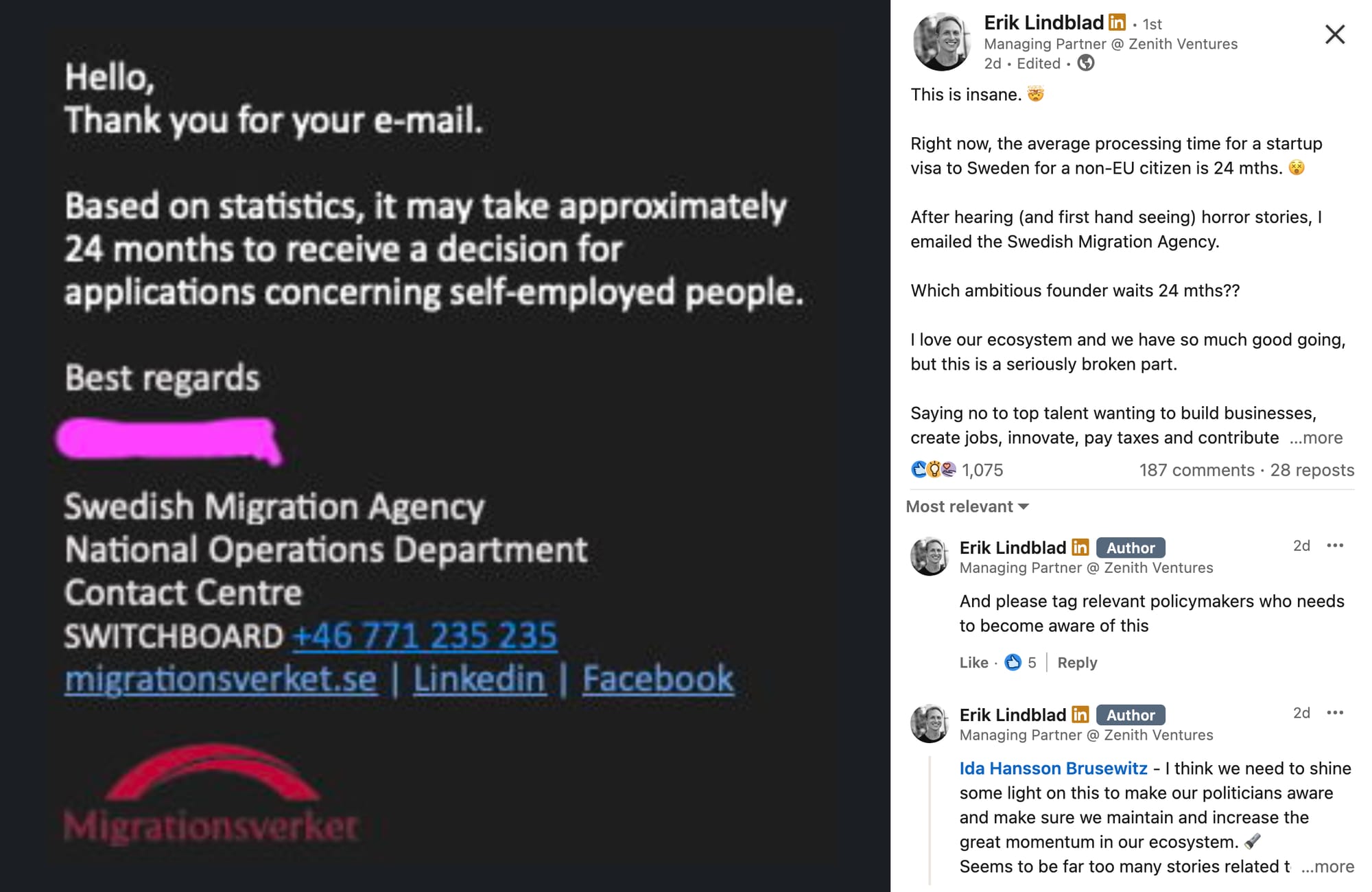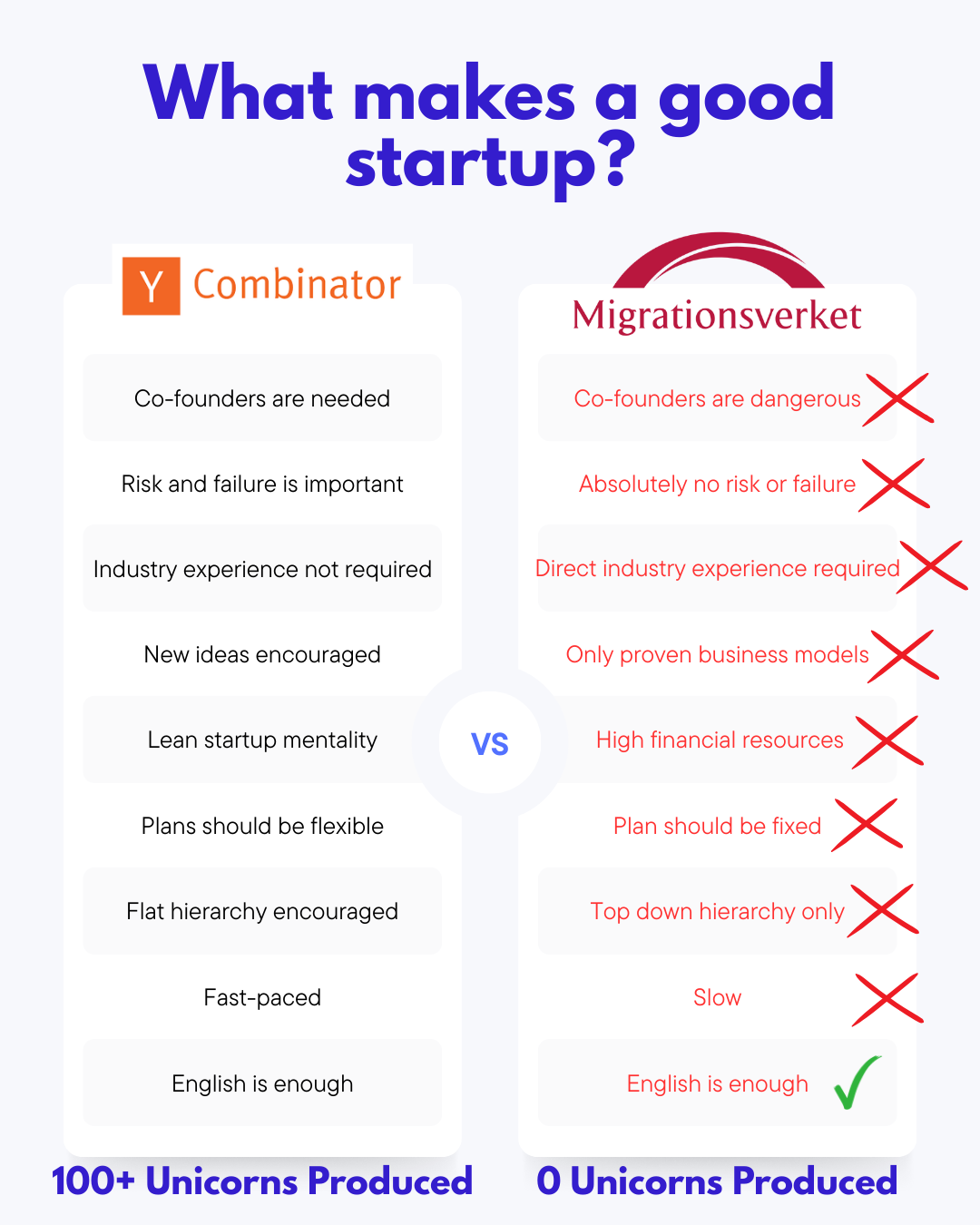Non-EU and Want to engage in Sweden's startup ecosystem? Oxford Admission is Likelier
EXCLUSIVE: Editor Daniel Alestrand interviewed Migrationsverket, Swedish Immigration Specialists and Founders to get to the bottom of this issue: it's near-impossible to get a self-employed visa as a startup founder from outside the EU.

The Stockholm tech startup ecosystem clearly works: Klarna had the largest IPO of 2025, Karl Pei's Nothing and Joel Hellermark's Sana (acquired by Workday) reached unicorn status and Ludvig Bergstrom's Nordic Tech Week launched with a bang... ALL IN THE SAME WEEK!
It's no wonder why Stockholm, aside from San Fransisco, is the most desirable city to build a startup. Not to flout Jantelagen but we're f****ing awesome. It's just a massive shame that the borders are essentially CLOSED to every founder who isn't an EU citizen - this reputation is making Sweden lose global talent.
Earlier this month, Zenith Ventures' Erik Lindblad went viral on LinkedIn for an email exchange with Migrationsverket (the Swedish Migration Agency) regarding application processing times for startup founders.
Lindblad shared an email response where, according to Migrationsverket, "it may take approximately 24 months to receive a decision for applications concerning self-employed people [for non-EU founders]."

Migrationsverket, the Swedish Migration Agency, is in charge of applying migration law set by the government to determine whether non-EU founders can enter, live and build in Sweden. In their own words, "we have the law to follow, the paragraph is short, but it contains key notes."
Members of the Swedish startup ecosystem have quickly responded in support of Lindblad's claim, "[2 years waiting time] is insane." This includes representatives from top firms like Norrsken, Antler, People Ventures, and SSE Business Lab.
It's no wonder why the Swedish tech startup community are furious about how non-EU founders struggle to enter Sweden. Some examples of startups founded by immigrant (non-EU) founders in Europe include Deliveroo ($3.6bn+), Revolut ($75bn+), Ivalua ($1bn+), Aircall ($1bn+), Brevo ($1.1bn+) and that's just the tip of the iceberg. It's unfair to expect Sweden to have successful, non-EU startups when migration law looks down startup culture.
To tease the article, I posted just ONE statistic on LinkedIn: Sweden's self-employed visa has a 7% acceptance rate whereas Oxford has admission stats of 14%; Sweden's self-employed visa is the "Oxford" of visas when it comes to meeting their requirements as a startup, 5%-15% acceptance rates are insanely low.
Anyway, this post on Sweden's self-employed visa attracted over 100,000 people in LESS THAN 24 HOURS on LinkedIn alone. Clearly it's a topic that resonates and affects us all!
Enough of the blabber, click the totally not rigged 8-ball of fortune to see whether we should start with the good news or bad news.
Do you want the good news or the bad news first?
Good or bad news first?
According to Migrationsverket, 24 months is a worst-case scenario based on processing times in the last 12 months. The average processing time for an application now sits at 9 months after dealing with 500 cases from January to July 2025. Until applications from 24 months ago are solved, this figure will remain at that amount.
The other piece of good news is that the self-employed visa is not required to build a startup in Sweden. If you have permission to be in Sweden, you are able to start your own company regardless of which visa you are on; non-EU founders can apply for the 9-month "Look for work or start a business" visa given they have a Masters degree and are able to be self-sufficient in Sweden.
That's it, moving on to the bad news (aka, the rest).
It appears that startup founders are the black sheep in Swedish migration law where there's nothing specific on them and they're categorised into a generic box. "The requirements for approving a residence permit are set by legislation, and our job is to match people to those legal requirements. The law does not give us much guidance on how to evaluate new businesses, so we can only use what’s written there."
When Migrationsverket was asked what startup must meet, I was able to make a rough checklist: risk free, 51% ownership, turning a profit already, a strong strong business plan, proof you were successful in a similar company and so on. For someone unfamiliar with startups, this might seem like a good list; for someone familiar, it's a comedically bad list which contradicts what every good startup must have.
To put it in perspective, here's a table with what Y Combinator considers to be recipe for a successful startup compared to Migrationsverket.

Requiring such concrete proof might seem like a good initiative from Sweden... but for me it signals something completely different: whoever is assessing these startups have either no or very little experience in the startup industry. Turns out I was right, MIGRATION OFFICERS the only ones who are determining whether a business will be successful or not.
Starring at Sweden's dated self-employed visa for too long might make you start to wonder a few things: Do any countries currently offer a startup visa? What does a good startup visa look like? What countries do non-EU founders pick over Sweden and why?
When the term "startup" is mentioned in the context of migration, Portugal sticks out like the sun in our solar system. Here are the founder requirements: 18+, proof you can be self-sufficient, no criminal record and valid health insurance. Here are the startup requirements: must focus on innovation or technology, must aim to create employment in the Portuguese economy, the business plan must have potential to generate €325,000 (annual turnover or assets) within 5 years and an approved business plan.
Guess who analyses the business plan in Portugal? Approved startup incubators, not migration officers. Notice how it's not restricted to one founder? Co-founders are encouraged where up to 5 founders can apply for the startup visa using the same startup.
Not to throw shade... but with the amount of venture capital firms and accelerators in Sweden, you'd expect the Swedish to be able to consult at least one of them to help with the migration process. Then again, maybe the Swedish government was too busy holidaying in Portugal to take notice of their excellent approach to startups - I don't blame them, it's a fabulous country.

From 2022 to 2024, the self-employed visa acceptance rate for first-time applicants averaged at around 20%. In 2025, despite having 27% more applications, Migrationsverket has reported that the acceptance rate has dropped to 7%. Considering that startups appear to be the anti-Christ in Swedish migration law, and I've spoken to genius founders who were rejected, I'd assume that figure to be a lot lower.
With all this information, you might be thinking that Migrationsverket is pretty powerless when changing migration law. And that's true. All they can make are small suggestions (främja) for minor changes but nothing like, "Hey! Sweden needs a startup visa."
That being said, there's currently an initiative called "Work in Sweden" going on where the government agencies are able to give more comprehensive reports to the government... such as introducing a startup visa. The reason why this is listed in the bad news section is that the next report isn't until March 2026... and the one after, the final one, being March 2027.
In theory, we could see a startup visa enter talks in March 2026... in theory. The only issue about this is that Migrationsverket "doesn't have a responsibility to make sure [Sweden] doesn't miss out [on global talent], we have our part to play, but it's not our main task." Essentially, it's reliant that these issues are expressed by the visa applicants, plastered across the media, and eager journalists like me pester them with questions.
One more thing, when we contacted Swedish political leader Ebba Busch to speak on this issue, we didn't receive the nicest reply in the slightest. Given that there's a petition to remove her from government... not the best look.
Moooooving on... what do the Swedish public think?
If you're wondering about the amount who would oppose the introduction of a startup visa, only 0.0014% of 140,000 from Stockholm Valley's survey stated that they would not like it. Biases do come in the form that this was posted on LinkedIn, however, if the majority of those in the ecosystem are wanting non-EU founders to build here - reform is clearly needed!
"It's a broken system and one that doesn't reflect Sweden's reputation as a unicorn-maker. Yes, startups are incredibly risky, and many fail. But there has to be some sort of middle ground so we're not crushing innovation and game-changers," says immigration specialist Saaya Sorrells-Weatherford. "I have advised on a lot of self-employed permit applications this year [...] it's been the hardest permit to work with so far."
Honestly, couldn't agree more. As the Brits say, "Nuff said."
"It’s like when a consumer wants to buy something and you don’t have it in stock: they will buy it somewhere else," says former CEO of booking.com Keels Koolen. "This is a moment to be proud on our country; The Netherlands. Home to many leading European tech companies."
Although Sweden's a hotspot for founders, it's gaining an ugly reputation of being difficult and leading them to pick other places: the Netherland, France, Britain, Denmark, Portugal, and so on. As someone who loves the Netherlands, I don't blame the founders. As a Swede, I feel nothing more than ashamed.
"As a US based recruiter I network with top talent open to moving to Europe," says Andrea Tegstam. "Savvy ones hear that Sweden is tricky and that Denmark or other countries are easier..."
While Silicon Valhalla was cheering that cracked American founders and VCs were moving to Europe, it's safe to say a lot of us weren't aware of how tough it would be to come to Sweden. Denmark is clearly reaping the benefits - that's great, #SiliconValhalla ⚔️⚔️⚔️ - but it's now leaving Swedes to be the stingy brother that we're missing out on that opportunity.

